- Home
- Harlan Coben
Run Away Page 10
Run Away Read online
Page 10
“Simon?”
“What?”
“You’re not thinking straight. Their mother has been shot. She’s in surgery.”
He squeezed his eyes shut.
“I’ll pick up Anya,” she said, “Robert will get Sam. They should be at the hospital.”
Yvonne left off the “me too,” maybe because the kids were more important or maybe because Yvonne and Ingrid were not very close. They were civil to each other, unfailingly polite with no obvious rancor, but Simon was the bridge between the two sisters.
Yvonne spoke again. “Okay, Simon?”
Two cops appeared, doing the room-scan thing. They spotted Simon and swaggered toward him.
“Okay,” he said, and hung up.
At the scene, Simon had given the cops a description of the shooter, but now they wanted more details. He started to tell the cops everything, but it was slow going without full context, without going into Aaron and the other murder and all that. He was also distracted, staring at the door, waiting for a doctor to appear, a god really, to tell him whether his world was over or not.
Fagbenle burst into the waiting room. The two cops moved toward him. The three of them huddled in the corner. Simon took the break to once again head over to the desk and ask about his wife—and once again the receptionist politely told him that she had no new information, that the doctor would come out as soon as there was an update.
When Simon turned back around, Fagbenle was right there. “I don’t understand. Why were you two in the Bronx?”
“We were trying to find our daughter.”
“By visiting a drug den?”
“Our daughter is a drug addict.”
“Did you find her?”
“No, Detective. In case you didn’t hear, my wife was shot.”
“I’m really sorry about that.”
Simon closed his eyes, waved him off.
“I hear you also visited the murder scene.”
“Yes.”
“Why?”
“That’s where we started.”
“Started what?”
“Looking for our daughter.”
“How did you get from that apartment to the drug house next door?”
Simon knew better than to go there. “What does that matter?”
“Why don’t you want to tell me, Simon?”
“Because it doesn’t matter.”
“Gotta be honest,” Fagbenle said. “This all doesn’t look good.”
“Gotta be honest,” Simon said. “I don’t care how it looks.”
Simon moved back toward his yellow plastic molded chair.
“Occam’s razor,” Fagbenle said. “You know it?”
“I’m not in the mood, Detective.”
“It states—”
“I know what it states—”
“—that the simplest explanation is usually the right one.”
“And what’s the simplest explanation, Detective?”
“You killed Aaron Corval,” he said. Just like that. No emotion, no rancor, no surprise. “Or your wife did. I wouldn’t blame either of you. The man was a monster. He was slowly poisoning your daughter, killing her right in front of your eyes.”
Simon frowned. “Is this the part where I break down and confess?”
“Nah, you just listen. I’m talking about the old moral quandary.”
“Uh-huh.”
“Question: Would you kill someone? Answer: No, of course not. Question: Would you kill someone to save your child? Answer…?”
Fagbenle raised both palms and shrugged.
Simon sat back down. Fagbenle pulled up a nearby chair and sat close to him. He kept his voice low.
“You could have sneaked out of your apartment building when Anya was asleep. Or Ingrid could have run over to the Bronx during her work break.”
“You don’t believe that.”
He made a maybe-yes, maybe-no gesture with his head. “I heard when your wife was shot, you jumped on top of her. Used your body as a shield.”
“What’s your point?”
“You were willing to die to save someone you love,” Fagbenle said, moving in a little closer. “How much of a stretch is it to believe you’d kill?”
There was movement all around them—people in and out—but Simon and Fagbenle saw none of that.
“I have an idea, Detective.”
“I’m all ears.”
“My wife was shot by a man named Luther.” Simon gave him the same description he’d already given twice now. “Why don’t you guys find and arrest him?”
“We already did.”
“Wait, you caught him?”
“It wasn’t really hard. We just followed the blood trail. We found him unconscious about two blocks away.”
“The big guy, Rocco, he took him out of the basement. He was carrying him.”
“Rocco Canard. Yeah, we know him. Gang affiliated. Luther Ritz—that’s his last name, by the way—worked for Rocco. So did Aaron. Rocco probably tried to hide him. When he saw the blood trail, Rocco dumped him in an alley. At least that’s our theory. We will need you to identify the guy to make sure he’s your shooter.”
“Okay,” Simon said. “How bad was he hit?”
“He’ll live.”
“Did he say anything on the way in?”
“Yeah,” Fagbenle said, flashing the smile, “he said you and Ingrid shot him.”
“That’s a lie.”
“That much we know. But I still don’t understand what happened. Why did he shoot?”
“I don’t know. We were just talking to Rocco and—”
“You and your wife?”
“Yes.”
“So you two, what, just waltzed into this drug den and started chatting up a gang leader?”
“Like you said, Detective: what we do to help a loved one.”
Fagbenle seemed to like that answer. “Go on.”
Simon told him what happened, leaving out only one key aspect.
“And then Luther just started firing at you?”
“Yes.”
“No warning?”
“None.”
“There you go.” Another flash of teeth. “Occam’s razor again.”
“How so?” Simon asked.
“Rocco is a drug dealer. Luther and Aaron both worked for him. That’s a world loaded with violence. Aaron ends up dead, Luther shoots at you guys—speaking of which, who shot Luther?”
A man plopped down in the molded yellow seat across from them. He was holding a bandage on his head. Blood oozed through the gauze.
“Simon?”
“What?”
“Your wife is hit with a bullet. You dive to cover her. Luther is going to finish you off. So who stopped him?”
“I didn’t see anyone,” he said.
Fagbenle heard something in his tone. “I didn’t ask if you saw anyone. I asked who saved you from Luther.”
But just then Anya came sprinting into the room. Simon stood as his daughter wrapped her arms around him, nearly knocking him over. He closed his eyes and held her close, willing the tears to stay back. Anya buried her face in his chest.
“Mom…” she muffle-cried.
He almost said, “It’s going to be okay” or “She’ll be fine,” but he saw no reason to tell more lies. His eyes opened. Yvonne crossed the room and kissed his cheek as he still held Anya.
“Robert is on his way to get Sam,” she said.
“Thank you.”
Then a man in hospital scrubs came into the room. “Simon Greene?”
Anya slowly released her grip and freed her father.
“Right here.”
“Follow me, please. The doctor will see you now.”
Chapter
Twelve
You often hear that a physician’s bedside manner is more or less irrelevant. The theory seems to suggest that you just want someone who coldly, mechanically, robotically does the job, who doesn’t get distracted by emotion, who lives by t
hat old saw that you’d rather have a surgeon who cuts straight and cares less.
Ingrid, Simon knew, believed the opposite.
You want a real person—a caring, empathic person—to be your physician. You want a person who sees you as a fellow human being who is scared and hurting and in need of reassurance and comfort. It was a responsibility Ingrid took very seriously. When a parent brought their child to see her—well, step back and think about it: When are you ever more vulnerable? You’re stressed, you’re terrified, you’re confused. Physicians who do not understand that, who act as though you are an anatomical object in need of repair like a MacBook visiting the Genius Bar are going to not only make the experience more miserable but they will miss something in the diagnosis.
Sometimes, like right now, you are scared and hurting and stressed and terrified and confused as you take a seat across from a physician who speaks words that will change your life like no others. They could be the worst words in the world or the best words or, as in this case, somewhere in between.
So Ingrid would really like Dr. Heather Grewe, who oozed both exhaustion and empathy. Grewe tried to break it down, aiming for a combination of real-world terminology and medical jargon. Simon focused on the bottom line.
Ingrid was still alive.
Barely.
She was in a coma.
The next twenty-four hours would be crucial.
Simon nodded along, but somewhere the doctor’s words had untethered him. He was trying to hold on, but he was floating away. Yvonne, who sat next to him, remained firmly grounded. She asked follow-up questions, probably good ones, but they didn’t change the meaning or clarify the murky diagnosis. This is another thing you learn about doctors. We may think they are gods sometimes, but the limits of what they know or can do are both astounding and humbling.
They were closely monitoring Ingrid’s condition, but there was nothing to do right now but wait. Dr. Grewe rose and extended her hand. Simon rose and shook it. So did Yvonne. There were no visitors allowed yet so they stumbled back down the corridor toward the waiting room.
Fagbenle cut Simon off and pulled him aside.
“I need something from you,” Fagbenle said.
Simon, still reeling, managed a nod. “Okay.”
“I need you to look at something.”
He handed Simon a sheet of cardboard with six photographs on it, three in the top row, three on the bottom. They were all headshots and underneath each headshot was a number.
“I want you to study this carefully and tell me if—”
“Number Five,” Simon said.
“Let me finish. I want you to study this carefully and tell me if you recognize any of these men.”
“I recognize Number Five.”
“How do you know Number Five?”
“He’s the man who shot my wife.”
Fagbenle nodded. “I’d like you to make a formal ID in person.”
“This”—Simon pointed to the cardboard sheet—“isn’t enough?”
“I think it would also be better to do it in person.”
“I don’t want to leave my wife right now.”
“You don’t have to. The suspect is here too—recovering from the gunshot. Come on.”
Fagbenle started down the corridor. Simon looked back at Yvonne, who nodded for him to go. The walk wasn’t far, just to the end of the corridor.
“Did you catch Rocco too?” Simon asked.
“We brought him in, yeah.”
“What did he say?”
“You and your wife came into his establishment, he had his back turned, there were gunshots, he ran. He has no idea who fired or who got shot or any of that.”
“That’s bullshit.”
“Really? Rocco, a leading drug dealer, is lying to us? Wow, I for one am shocked.”
“Did you ask him about my daughter?”
“Doesn’t know her. ‘White girls all look the same to me,’ he said, ‘especially junkies.’”
Simon didn’t wince. “Can you hold him?”
“On what charge? You yourself said Rocco never attacked you, right?”
“Right.”
“Luther was the one who pulled the trigger. Speaking of which.”
He stopped in front of a room with a uniformed cop sitting by the door. “Hey, Tony,” Fagbenle said.
Tony the guard looked at Simon.
“Who’s this?”
“The vic’s husband.”
“Oh.” Tony the guard nodded toward Simon. “Sorry.”
“Thanks.”
“He’s here to make an ID,” Fagbenle said. “Assume the perp is still out?”
“Nah, he’s awake.”
“Since when?”
“Five, ten minutes ago.”
Fagbenle turned to Simon. “Probably not a good idea to do this now.”
“Why not?”
“Protocol. Most witnesses are scared to be face-to-face with the perp.”
Simon frowned. “Let’s just do this.”
“It doesn’t bother you that he’ll see you?”
“He saw me when he shot my wife. You think I care?”
Fagbenle shrugged a suit-yourself and pushed open the door. A television played something in Spanish. Luther sat up in the bed, his shoulder wrapped. He gave Simon a scowl and said, “What’s he doing in here?”
“Oh, so you know this man?” Fagbenle asked.
Luther’s eyes shifted left and right. “Uh…”
Fagbenle turned to Simon. “Mr. Greene?”
“Yes, he’s the man who shot my wife.”
“That’s a lie!”
“You’re certain?” Fagbenle asked.
“Yes,” Simon said, “I’m certain.”
“They shot me!” Luther shouted.
“Did they, Luther?”
“Yeah. He’s a liar.”
“Where did they shoot you exactly?”
“In the shoulder.”
“No, Luther, I mean geographical location.”
“Huh?”
Fagbenle rolled his eyes. “The place, Luther.”
“Oh, in that basement. In Rocco’s lot.”
“So why did we find you hiding in an alley two blocks away?”
You could see the dumb stamped all over him. “Uh, I ran. From him.”
“And hid in an alley even when the police came searching for you?”
“Hey, I don’t like cops, that’s all.”
“Great, thanks for confirming that you were at the shooting scene, Luther. Really helps us wrap this all up.”
“I didn’t shoot nobody. You got no proof.”
“Do you own a gun, Luther?”
“No.”
“Never fired one?”
“A gun?” He got a cagey look. “Maybe once, like years ago.”
“Man, Luther, don’t you watch TV?”
“What?”
“Like every cop show.”
Luther looked confused.
“There’s always the part where some moronic perp says, ‘I never fired the gun,’ you know, like you just did, and then the cop says they ran a gunshot residue test—this ringing any bells, Luther?—and they find residue, usually in the form of gunpowder particles, on the moronic perp’s hands and clothes.”
Luther’s face lost color.
“And, see, once they have all that, the cops—that would be me—have the guy dead to rights. We have witnesses and gun residue and scientific proof our moronic perp is a liar. It’s over for him. He usually confesses and tries to cut a deal.”
Luther sat back and blinked.
“You want to tell us why you did it?”
“I didn’t do it.”
Fagbenle sighed. “You’re really boring us now.”
“Why don’t you ask him why?” Luther asked.
“Pardon?”
Luther tilted his chin toward Simon. “Ask him.”
Simon took deep breaths. He’d been blocking since he entered the room, but now it a
ll came crashing down on him. Ingrid, the woman he loved like no other, was nearby, in this very building, clinging to life because of this piece of shit. Without conscious thought, Simon took a step toward the bed, raising his hands to throttle the useless turd, this nothing, this worthless dung who had tried to snuff out the life of such a wonderful, vibrant being.
Fagbenle put an arm out to keep Simon in check, more a mental blockade than a physical one. He met Simon’s eyes and gave an understanding but firm shake of the head.
“What should I ask him, Luther?” Fagbenle asked.
“What were they two doing at Rocco’s, huh? Let’s say I did do it. Not really, but like pretend, like what’s the word…hypodermically, let’s say I did it.”
Fagbenle tried not to frown. “Go for it.”
“Maybe Rocco needs protection.”
“Why would Rocco need protection?”
“Don’t know. I’m talking hypodermically.”
“So Rocco told you to shoot Dr. Greene?”
“Doctor?” He sat up, wincing. “What are you talking about? I didn’t shoot no doctor. You ain’t pinning that on me.” He pointed at Simon. “I just shot his old lady.”
Simon didn’t know whether he should burst out punching or laughing. Again the sheer outrage of the situation—that even this worthless slice of nothing has the power to destroy something as vital and cherished and loved as Ingrid—consumed him, making him realize that there was nothing just in this world, no control, no center force, just random chaos. He wanted to kill this punk, stomp him out like the bug that he was, except no bug could ever be this callous and harmful, so yes, stomp out this nothing for the good of mankind—much gained, nothing lost. And yet he suddenly felt exhausted by the notion, that in the end there was no point in doing even that. It was all a big fucking joke.
“I was just protecting my boss,” Luther said. “Self-defense, you know what I’m saying?”
Simon felt his phone vibrate. He glanced at the screen. It was from Yvonne:
We can see Ingrid now.
* * *
When Simon first entered her room, when he first saw Ingrid on that bed, stiller than sleep, tubes everywhere, gurgling machines—when he first saw all of that, his knees buckled and his body fell toward the floor. He didn’t catch himself. He probably could have, probably could have reached out and grabbed the wheelchair accessibility bar on his right. But he didn’t. He let himself land and land hard and let himself have the silent scream, that moment, because he knew that he needed it.

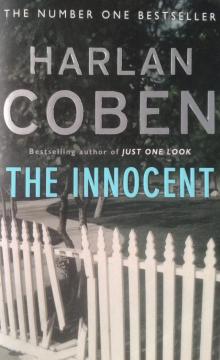 The Innocent
The Innocent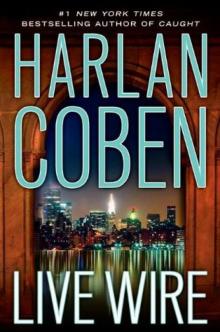 Live Wire
Live Wire Play Dead
Play Dead Drop Shot
Drop Shot Seconds Away
Seconds Away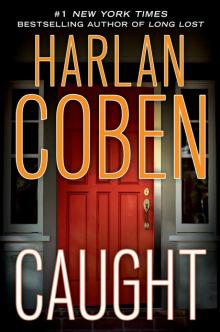 Caught
Caught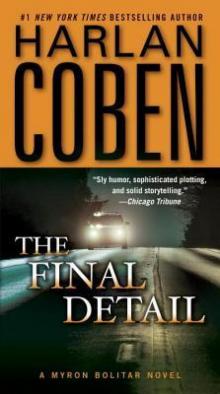 The Final Detail
The Final Detail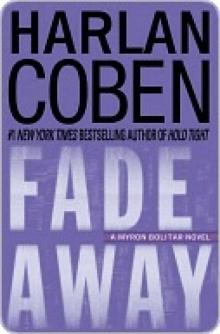 Fade Away
Fade Away Home
Home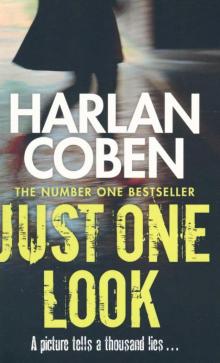 Just One Look
Just One Look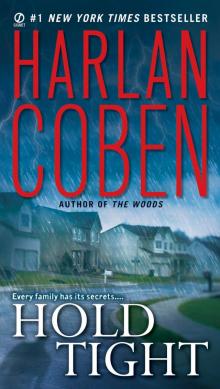 Hold Tight
Hold Tight Fool Me Once
Fool Me Once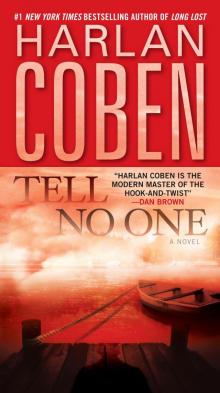 Tell No One
Tell No One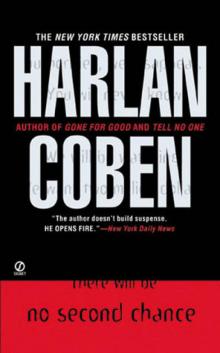 No Second Chance
No Second Chance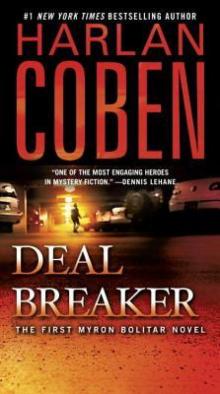 Deal Breaker
Deal Breaker Long Lost
Long Lost One False Move
One False Move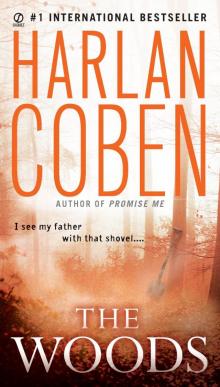 The Woods
The Woods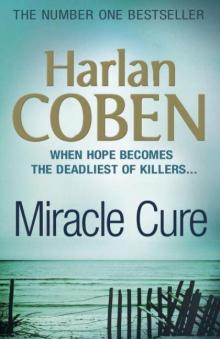 Miracle Cure
Miracle Cure Found
Found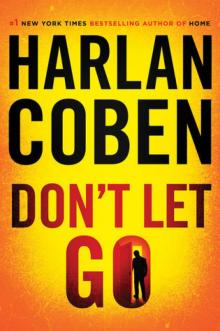 Don't Let Go
Don't Let Go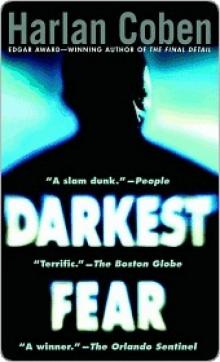 Darkest Fear
Darkest Fear The Stranger
The Stranger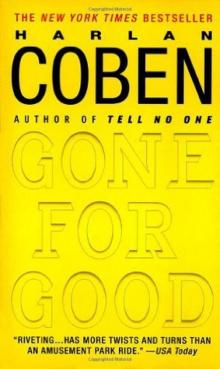 Gone for Good
Gone for Good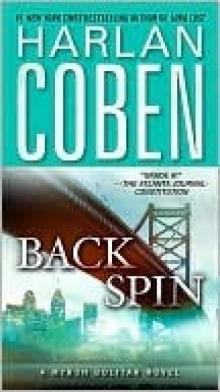 Back Spin
Back Spin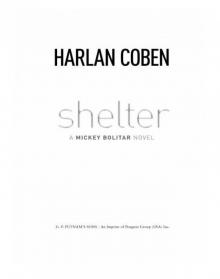 Shelter
Shelter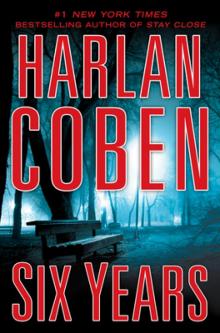 Six Years
Six Years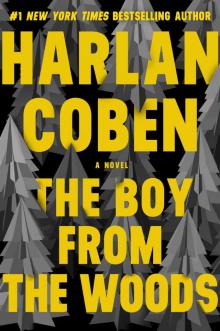 The Boy from the Woods
The Boy from the Woods Missing You
Missing You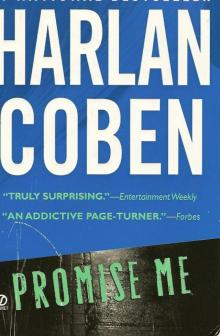 Promise Me mb-8
Promise Me mb-8 The Final Detail: A Myron Bolitar Novel
The Final Detail: A Myron Bolitar Novel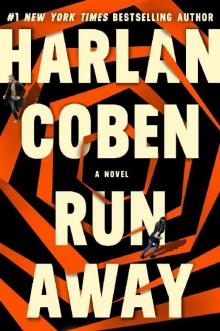 Run Away
Run Away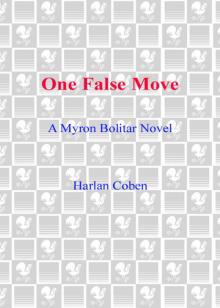 One False Move: A Myron Bolitar Novel
One False Move: A Myron Bolitar Novel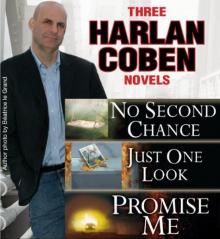 Three Harlan Coben Novels
Three Harlan Coben Novels the Woods (2007)
the Woods (2007) Tell No One (2001)
Tell No One (2001) the Innocent (2005)
the Innocent (2005)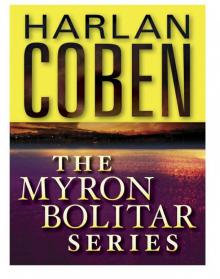 The Myron Bolitar Series 7-Book Bundle
The Myron Bolitar Series 7-Book Bundle Gone for Good (2002)
Gone for Good (2002) Caught (2010)
Caught (2010) Hold Tight (2008)
Hold Tight (2008)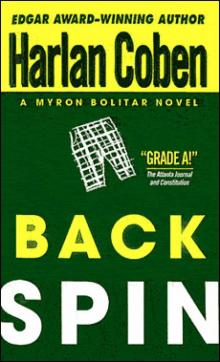 04 - Back Spin
04 - Back Spin Miracle Cure (1991)
Miracle Cure (1991) Harlan Coben 3 Novel Collection
Harlan Coben 3 Novel Collection Just One Look (2004)
Just One Look (2004)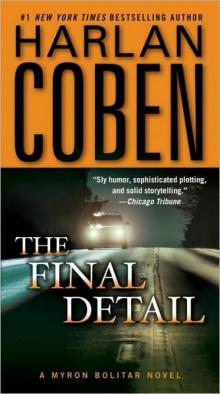 The Final Detail mb-6
The Final Detail mb-6 Play Dead (2010)
Play Dead (2010)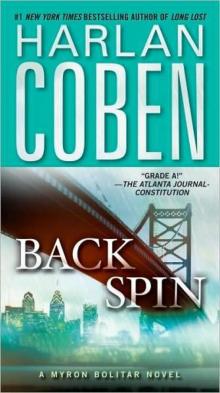 Back Spin mb-4
Back Spin mb-4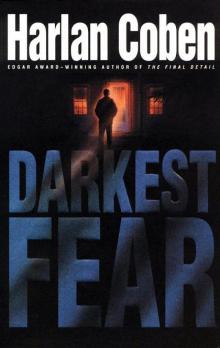 Darkest Fear mb-7
Darkest Fear mb-7